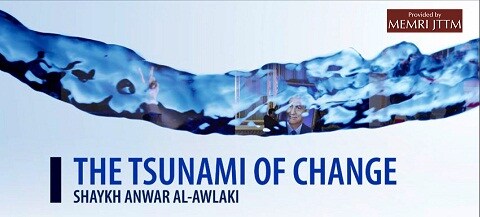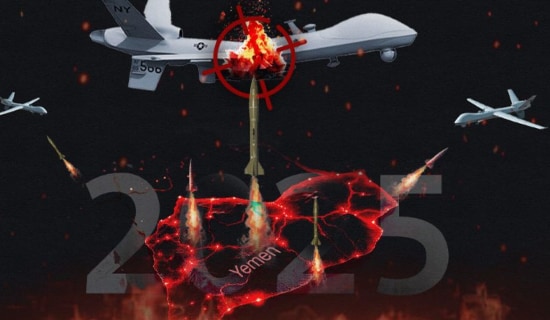On March 29, 2011, Al-Malahem, the media wing of Al-Qaeda in the Arabian Peninsula (AQAP), released the fifth issue of the English-language jihadist magazine Inspire.
The cover of the 70-page issue, which is dated Spring 1431/2011, depicts a globe rotated to show the U.S. sinking into a body of water. The cover story is by Sheikh Anwar Al-Awlaki, and is titled "The Tsunami of Change."

The table of contents lists two articles by Ayman Al-Zawahiri; the first is "The Short and Long-Term Plans After Protests," and appears to be taken from a previous Al-Qaeda publication from 2007 titled "The Advice of One Concerned." The second, titled "The Overlooked Backdrop," was taken from Al-Zawahiri's third "Message of Hope and Glad Tidings to Our People in Egypt," which was released in early March 2011.
Inspire No. V includes further articles in series begun in previous Inspire issues, including "What to Expect in Jihad" by Mukhtar Hassan, "Individual Terrorism Jihad" by Abu Mus'ab Al-Suri, "Open Source Jihad," "Jihad Stories," and an article by U.S. citizen Samir Khan, who is thought to be the force behind Inspire, as well as an interview with AQAP military commander Sheikh Abu Hurairah, and an article by "Abu Suhail" which is an alias used in the past by American Al-Qaeda operative Adam Gadahn. There is no message or article, or other material attributed to Osama bin Laden, and this is the first issue of Inspire to include an article by Al-Zarqawi's mentor Sheikh Abu Muhammad Al-Maqdisi. Also included is a poem mocking Libyan leader Mu'ammar Al-Gadhafi.
An overarching theme throughout this issue of the magazine - which was also evident in previous issues, is that of Da'wah - religious outreach. This issue includes an invitation to send questions to Sheikh Anwar Al-Awlaki himself, adding that AQAP "will hold an exclusive video interview with Sheikh [Al-Awlaki] where he will answer your questions."
It should be noted that the quality of the magazine, including the graphics and fonts and overall professional look, have been steadily improving since the first issue; this trend can be expected to continue in future issues.
The following report is a review of the fifth issue of Inspire.
"Letter from the Editor - Protest Focus, Spring 2011": Claims Revolts Are Good for Al-Qaeda, Criticizes YouTube For Removing Al-Awlaki Lectures
Yahya Ibrahim, who had numerous articles in previous issues devoted to giving ideas to young Al-Qaeda followers interested in ways to carry out successful terrorist attacks, wrote in the Letter from the Editor feature that the central issue of all the current protests in the Middle East was the liberation of Al-Aqsa. Under the title "Protest Focus, Spring 2011," he wrote: "There could be no freeing of Palestine with the presence of the likes of King Abdullah to the East, Hosni Mubarak to the West and al-Saud to the South. Now that Hosni is gone, we heard the Imam of the Friday prayers praying: "O Allah we ask you to allow us to meet in al-Aqsa," and the millions in Tahrir square roared with one voice Âmîn. The issue of Palestine is central to the Muslim ummah and now that the masses have spoken, there is no doubt that it will be back to the forefront."
Ibrahim goes on to state that the current situation in the Middle East is good for Al-Qaeda, and refers to Western claims that the "revolts" are hurting the organization as false. He explains that the revolutions that are "shaking the thrones of dictators are good for the Muslims, good for the mujahideen and bad for the imperialists of the West and their henchmen in the Muslim world." He adds, "Al-Qaeda is not against regime changes through protests but it is against the idea that the change should be only through peaceful means to the exclusion of the use of force."
The piece also mocked Western "freedom of expression" for trying to restrict "the messages of the mujahideen" and to "ban the spread of books and talks of Al-Qaeda leadership," and criticized "the U.S. request...[for] YouTube to take down lectures by Shekih Anwar Al-Awlaki."
"Inspire Responses - Responding to Inquiries;" Encourages Western Jihadists to Attack Night Clubs and Shopping Malls
As noted in the MEMRI analysis of the fourth issue of Inspire, dated Winter 2011, each issue of the magazine includes information for readers on how to submit questions. This section in Inspire V addresses a question emailed in by an anonymous Muslim living in the West, who asks for AQAP's guidance regarding the best way to join the jihad and reach the jihad frontiers. In reply, the AQAP representative recommends that the inquirer carry out a personal jihad mission with a lone wolf attack in a crowded area in his country in the West, rather than attempt to reach a jihad front; it notes that this method has proven to be the most successful for jihadists living in the West.
The AQAP representative states: "[T]he mujahideen leadership [is] today asking the brothers in the West specifically to attack Western interests in the West instead of coming here to Yemen, for example...[Many of] the foreign brothers [who] join the mujahideen...conclude that it would have been better for them to return to the West and launch operations. This is because killing 10 soldiers in America, for example, is much more effective than killing 100 apostates in the Yemeni military."
He continues: "With lone operations, however, as long as you keep it to yourself, nobody in the world would know what you're thinking and planning. That's why individuals like Taimour [Al-'Abdaly, the Stockholm bomber], Roshonara [Choudhary, a British citizen who stabbed an MP], Nidal [Hassan, the Fort Hood shooter] and others have been successful, even if they were ultimately arrested. The fact that they were able to pull off their operations without being halted by authorities is a great success."
"Open Source Jihad"

Another section of Inspire V is "Open Source Jihad," which is defined as: "A resource manual for those who loathe the tyrants; includes bomb-making techniques, security measures, guerrilla tactics, weapons training and all other jihad related activities. In previous issues, this section featured articles on making "a bomb in the kitchen of your mom" and on carrying out lone wolf attacks, and provided ideas for the latter such as driving trucks into crowded areas and destroying buildings. In Inspire V, which features an image of the Chrysler Building in New York City the subject is training with the AK2. It was written by Abu Salih, as part of the ongoing "Open Source Jihad Gun School" series. It instructs readers in the disassembly, cleaning, and reassembly of the weapon, with illustrations, and concludes with a preview of the sixth issue of Inspire, in which readers will learn about holding and aiming a rifle.
The section stresses that "it allows Muslims to train at home instead of risking a dangerous travel abroad: Look no further, the open source jihad is now at hands reach." This trend in Al-Qaeda strategy has already been analyzed by MEMRI, in "New Trend in Al-Qaeda's Recruitment Efforts: American Muslims Should Carry the Burden of Jihad in U.S."[1]
Interview with AQAP Military Commander Abu Hurairah; Provides Advice For Lone-Wolf Attacks in the West

Like previous issues of Inspire, this issue includes interviews with AQAP leaders; in this instance, the featured leader is AQAP military commander Sheikh Abu Hurairah. He talks about his family, including his brother at Guantanamo, and discusses his hatred of President Obama, saying that he "resembles a pharaoh." In the interview, he is asked what he thinks about lone-wolf attackers in the West, and what advice he has for Muslims in the West who are capable of attacks.
In answer to the first question, he suggests a retaliatory operation following every American drone attack or Israeli attack.
Articles by Anwar Al-Awlaki and Samir Khan
The two most notable articles in Inspire V are by Anwar Al-Awlaki and Samir Khan.
Al-Awlaki: "The Tsunami of Change"

In "The Tsunami of Change," Al-Awlaki celebrates the fall of Tunisian and Egyptian leaders Mubarak and Ben 'Ali, and expressed optimism regarding the future of the jihadist movement. In the long run, he claimed, unrest in the Arab world will enable the jihad movement to flourish, for several reasons. First, the toppling of the rulers of Tunisia and Egypt has broken down the barrier of fear among the Arab masses, and has shown that it is possible to bring down regimes. Second, the new regimes in the Arab world will not be as oppressive as the old ones against jihad operatives and supporters; thus, the latter will be able to operate relatively freely. Third, the spread of the unrest to Yemen and Libya - and especially the possibility that uprisings will break out in the Gulf countries, primarily Saudi Arabia - will open up new opportunities for jihad.
Al-Awlaki ridiculed the U.S. for abandoning Mubarak, and stated that the new situation will harm the U.S., since it will divert its attention and resources from the war on terror. He also noted that the West is wrong to think that the current events hurt Al-Qaeda.
Awlaki ends his article by promising that the current events will cause America more damage in the future: "America, since 9/11, has been focused on the fight with the mujahideen in Afghanistan, Pakistan, Iraq, and now Yemen. It has devoted its resources and intelligence to the 'fight on terror'. But with what is happening now in the Arab world, America will no doubt have to divert some of its attention to the unexpected avalanche that is burying its dear friends. America has depended on these men for the dirty work of protecting American imperial interests. They acted as point men that saved America from the effort of doing it themselves, but now, with their fall, America will have to divert huge amounts of effort and money to cultivate a new breed of collaborators. This will force America, which is already an exhausted empire, to spread itself thin, which in turn would be greatly beneficial for the mujahideen. Even without this wave of change in the Muslim world, the jihad movement was on the rise. With the new developments in the area, one can only expect that the great doors of opportunity would open up for the mujahideen all over the world."
Samir Khan: "The Egyptian"
In "The Egyptian," Samir Khan calls for the establishment of "an Islamic state in post-revolution Egypt - a state in which the primary source of authority is the Koran and the Sunnah." He said that if the government decides against this, the Egyptians should demonstrate their loyalty to Allah, rather than to the government. He also claims that the American demand that Egypt maintain its peace treaty with Israel runs counter to Islamic law, and adds that Egyptians must choose "the path that is right according to Islam - which contradicts the one which is acceptable according to democratic principles."
"Abu Suhail" - Perhaps Adam Gadahn - On Mubarak's Fall
An article titled "The Way Forward," by "Abu Suhail" - who, according to the National Counter Terrorism Center, could also be Al-Qaeda official Adam Gadahn,[2] discusses the day Mubarak fell and notes: "It has also proved that al Qaeda's rage is shared by the millions of Muslims across the world, whether they are in Egypt, Tunisia, Libya, Algeria, Yemen or elsewhere. Even in the countries where the protests haven't yet taken form, the [same] sentiment is apparent, such as in Saudi Arabia, Indonesia, India, Pakistan, Afghanistan, and elsewhere.
"For decades, Muslims in various parts of the Islamic world have desired the removal of their puppet regimes... This event [i.e. Mubarak's fall] has now clearly shown and exposes that Washington doesn't give a hoot as to who is in power - even if it's a dictator - as long as their greedy interests are fulfilled. In other words, it is America that benefits the most from autocratic regimes while the people suffer the greatest in various forms. Uncle Sam should have kept in mind the scientific formula of actions and reactions that states: Explosions are generated due to pressure. We are now witnessing a massive explosion throughout the Islamic lands and it doesn't seem to be settling down any time soon."
The article ends with odd phrases typical of Gadahn's speaking style: "If this Egyptian revolution has taught us anything, it has taught us that sitting and waiting for tyrants to fall is not practical; mobilization of the people is necessary for the tyrants to give in. This is what your brothers in the al Qaeda Organization and other jihadi organizations have been working for: inspiring the people all over the world to rise up for the Islamic cause of eliminating the tyrants so that we have a clear shot at Israel. It is a collective effort that requires the ummah to be on the same page. The fat donkey sitting on the pathway however is America. With a weakened America, it will allow us to stride about the lands in honor, with permission of Allah."
Al-Qaeda Outreach and Recruitment Efforts Aimed At Western Youth
As with previous issues of Inspire, Inspire V includes multiple sections informing readers how they can contact Al-Qaeda.

Another page of Inspire V offers ways for Muslim youth in the West to communicate with Al-Qaeda: "If you are interested in contributing to this magazine with any skills - be it writing, research, editing, or advice - or have any questions for us, you can contact us at any of the email addresses below. We strongly encourage everyone to use the Asrar al-Mujahideen program to get in touch with us as was explained in the first issue. Please take special precautions when using the program in order to avoid detection from the intelligence services." Three email addresses for Inspire are also provided, as is a public key for encrypting messages.
Inspire VI - A Preview
Inspire V includes multiple previews of articles to be published in the next issue, including "Jihad Stories" and Al-Suri's series on individual jihad.
*Steven Stalinsky is the Executive Director of The Middle East Media Research Institute
Latest Posts



